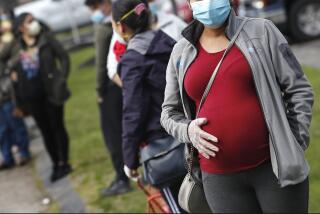Pregnancy and Breast Cancer Pose Lethal Risk : Health: A new study says expectant women who have the disease are three times as likely to die.
- Share via
Women who are pregnant when breast cancer is diagnosed are three times as likely to die from the disease as women who are not, Texas researchers report.
Furthermore, a recent pregnancy, extending as far back as four years before the diagnosis of the cancer, also increases the risk of a fatal outcome, but to a lesser degree, epidemiologists from the M.D. Anderson Cancer Center in Houston will report in Saturday’s issue of the international medical journal The Lancet.
The results, based on studies of 407 women in their 20s, may be due to changes in hormonal distribution or immune response during pregnancy, the researchers speculated. The new findings may explain why younger women, as a group, have a poorer prognosis than older women from breast cancer, said Dr. Vincent F. Guinee of M.D. Anderson.
The researchers also found that the mortality associated with breast cancer is independent of how far advanced the tumor is when it is detected. Results of previous, smaller studies that hinted at a pregnancy-breast cancer link suggested that the results may have occurred because breast cancer is detected at a later stage in pregnant women, perhaps because swelling of the breasts and other factors associated with pregnancy masked the tumors.
“We took all those things into account and we still see a large effect from pregnancy,” Guinee said.
Dr. Eugenia Calle of the American Cancer Society cautioned that women in their 20s represent less than 1% of all cases of breast cancer. “We’re concerned that young women might be very fearful (because of the study). We need to reiterate that it is a very rare disease at that age.”
Among women under the age of 30, one in every 2,426 develops breast cancer. By the age of 45, the number has grown to one in every 96. Over a woman’s life span, the risk of getting breast cancer is one in nine.
Both Calle and Guinee said the results with the young women should hold for pregnant women of all ages.
About 182,000 women will be diagnosed with breast cancer this year in the United States, making it the most common form of cancer in women, according to the American Cancer Society. About 46,000 will die from the disease--second among women only to lung cancer.
Guinee and others have been interested in the link between pregnancy and breast cancer, he said, because of evidence showing that younger women have poorer prognoses than older ones. “We could see that 20-year-olds don’t do as well as 30-year-olds, 30-year-olds don’t do as well as 40-year-olds, and so on,” he noted.
“Researchers hadn’t looked at it in terms of what might be causing (the higher mortality rate in younger women),” he said. “It was generally assumed that cancers might be more aggressive in younger women, or that they might be detected later (in the course of the disease). Our results show that it is the pregnancy itself that is responsible.”
Guinee’s international team studied 407 breast cancer patients who received care between 1978 and 1988 at one of the nine member institutions of the International Cancer Patient Data Exchange System.
Overall, they found that women who were pregnant when the breast cancer was diagnosed were 3.26 times as likely to die from the disease as women who had never been pregnant. When they adjusted for the stage of the disease at the time of detection--the size of the tumor, the number of lymph nodes involved and so on--the risk was reduced, but the women were still 2.83 times as likely to die.
They also looked at the effect of previous pregnancies on outcome. For women who had been pregnant in the year before the tumor was diagnosed, the risk of dying was about 15% less than for those who were pregnant at the time of the diagnosis. For those pregnant two years before, the risk was 30% less. The risk did not return to normal until the pregnancy had occurred five years before diagnosis.
The most likely cause for the increase risk is hormonal changes, said Dr. Janet Mohle-Boetani of the Santa Clara County Department of Health. Estrogen levels rise appreciably during pregnancy, and the female hormone has previously been shown to promote the growth of breast tumors.
Alternatively, the risk could be associated with changes in the immune system. Pregnant women have a slightly reduced immune efficiency and are more susceptible to infectious diseases, she said. “Immunologic changes might also predispose to poor control of a developing tumor.”






